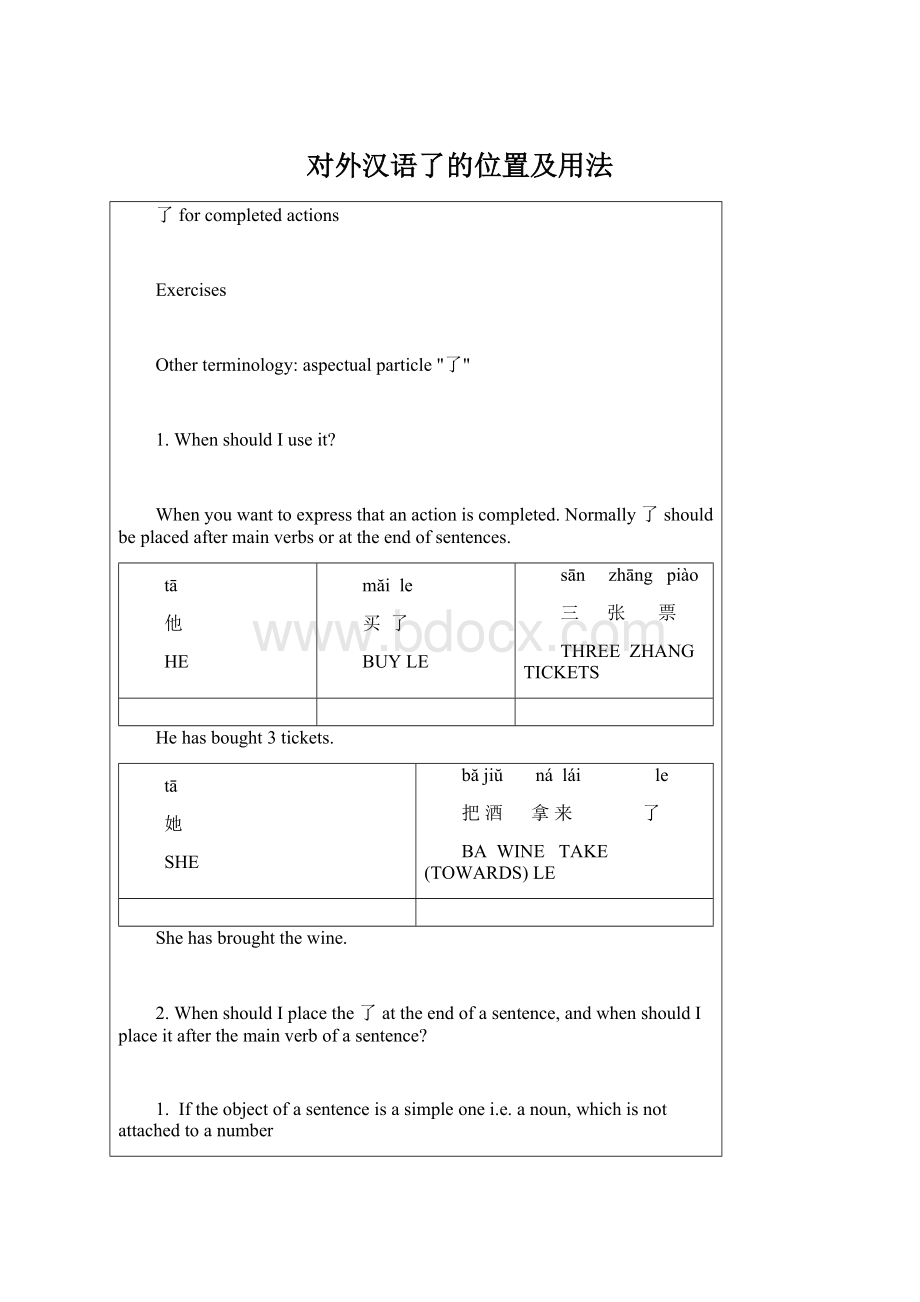 对外汉语了的位置及用法Word格式.docx
对外汉语了的位置及用法Word格式.docx
- 文档编号:17014470
- 上传时间:2022-11-27
- 格式:DOCX
- 页数:12
- 大小:22.84KB
对外汉语了的位置及用法Word格式.docx
《对外汉语了的位置及用法Word格式.docx》由会员分享,可在线阅读,更多相关《对外汉语了的位置及用法Word格式.docx(12页珍藏版)》请在冰豆网上搜索。

1.
Iftheobjectofasentenceisasimpleonei.e.anoun,whichisnotattachedtoanumber
andmeasureword,andnotattachedtoadescriptiveclause(的
clause),
canbeplacedattheendofthesentence.Inthiscasetheparticle
hasmanyfunctions:
itmayindicatethecompletedaction,orachangeofsituation,itmayalsoindicateanimminentaction.
s.
v.
o.
le
wŏmenchī
fà
n
我
们
吃
饭
了.
WE
EAT
MEALLE
We
haveeaten..
[Completedaction]
Nowweareeating.
(Wedidn'
teatbefore.)[Changeofsituation]
Weareabouttoeat.
(我
要
了.)
3.IsitincorrectifIplace
aftertheverbinasimple-objectsentence?
No,itisnotincorrect,butitseemsasifthesentenceisnotyetfinished.Itmaylooklikethefirstclauseofthe
verb了...就...construction.Forexample(Alsoseepattern5.),
tā
chī
n...
(jiù
qù
kà
dià
nyĭng)
他
...
(就
去
看
电
影.)
LE
MEAL...
(JIUGO
SEE
FILM)
Afterhefinishesthemeal...(he'
llgotoseeafilm.)
4.CanIplace
attheendofasentencethathasacomplexobject?
No.Iftheobjectofasentenceisacomplicatedone,i.e.itisprecededbyanumberwordandmeasureword,oradescriptiveclause,
isplacedafterthemainverbofthesentence.
le
num.
mw.
o.
chī
liăng
wăn
fà
两
碗
饭.
LE
TWO
BOWLS
RICE
Hehaseatentwobowlsofrice.
5.WhereshouldIplace
ifasentencehasatimemeasure?
Ifanactionisattachedtoatimemeasure(e.g.,duration,lengthoftime)oranactionmeasure(e.g.,manytimes),
isplacedafterthemainverb.Thefollowingthreealternativepatternssharethesamefeature,thatis,theyhave
afterthemainverbs.
letm.(am.)
de
(le)
HE
xué
leliăngniá
zhōngwé
学
年
的
中
文
(了*)
STUDY
YEAR
DE
CHINESE
(LE)
HestudiedChinesefor2years.
tm.(am.)
xué
leliăngniăn(le)
(了)
o.
v.
zhōngwé
nà
gedià
nyĭngwŏ
那个
影
liăngniăn
kà
nle
liăngbià
遍
(了**)
Ihavewatchedthatfilmtwice.
shì
wŭniá
nqiá
ndeshì
wŏmen
duō
niá
lăopé
ngyoule
那
是五
前
事
了.
我们
是
多
老
朋
友
THATISFIVEYEARAGODEMATTERLE
WE
AREMANYYEARS
OLDFRIEND
LE
Thatincidenthappened5yearsago
Wehavebeenoldfriendformanyyears.
6.Isatimemeasureplacedafter
inanegativesentence?
No,negativesentencesofthiskindarenormallyinadifferentwordorder.Thetime-measureshouldbeplacedbeforethenegation没.Forinstance,ifyouwanttosay:
"
Ihaven'
teatenChinesefoodforages."
Itshouldbeinthefollowingwordorder:
tm.
neg.
wŏ
我
I
hăojiŭ
好
久
LONGTIME
mé
没
NOT
zhōngguó
cà
i
国
菜
了
EAT
FOOD
Ihaven’teatenChinesefoodforalongtime.
7.DoIhavetoputthetime-measuresbefore
没
inallnegativesentences?
No.Ifyouwanttodenyanaffirmativestatementwhichhasatime-measure,thenthetime-measureshouldbeplacedafterthemainverb.
neg.
wŏmé
ixué
sānniá
nzhōngwé
n,
wŏzhĭ
n
文,
只学
年.
NOT
LEARN
3
CHINESE,
I
ONLY
LEARNLE
2
YEAR)
Ididn'
tlearnChinesefor3years,Ionlydidfor2years.
8.DoIhavetoput
aftereveryverbinasentence,ifthesentencehasasequenceofactions?
Ifasequenceofactionsinthesentencearecompleted,
isusuallyplacedafterthelastverbofthesentence.
s.
v.1
o.1
v.2
(tm.
)
o.2
GO
CHINA
sì
jīngjù
四
京
剧
FOURYEAR
PEKINGOPERA
HewenttoChinatostudyPekingoperafor4years.
măi
cí
qì
了瓷器
CHINA
HewenttoChinaandboughtsomeChina.
Ifyouleave
attheendofsentences,itnormallyindicatesachangeofthesituation.Let'
scomparethefollowingtwosentences:
1.(Completedaction)
tāqù
lezhōngwé
他去中
了中
文.
HEGO
STUDYLE
CHINESE
HewenttoChinaandstudiedChinese.
2.(Changeofsituation)
STUDYCHINESE
HehasgonetoChinatostudyChinese.(He'
snothere)
9.DoIalwayshavetoplace
afterthelastverbofasentencewhendescribingasequenceofactions?
No.Thereisanothersentencepattern,whichindicatessequenceofactions,butthefirstsequenceinthesentenceisconditional.Inthissentence
pattern
isplacedafterthefirstverbwhichisintheconditionalclause,andtheadverb
就
isplacedbeforethesecondverbofthesentence.Thiskindofconstructionhasasenseofurgency,whichmeansthattheactioninthe
clausetakesplaceimmediatelyafterthecompletionofthefirstaction.
v.1le
jiuv.2
dà
ole
jiù
zhăo
pé
ngyou.
到
找
.
ARRIVELE
JIU
LOOKFORFRIEND
He'
lllookforfriendimmediatelyafterhearrivesinChina.
Asyoucansee,thatsentencedescribestheactioninfuture,butifyouplaceanother
attheendofthesentence,thenitmeansthatbothactionshavetakenplace.
10.DoIalwayshavetouse
toindicateacompletedaction?
No,notalways.Firstofall,theparticle
forcompletedactionisnotusedinnegativesentences.Instead
shouldbeplacedbeforethemainverbofthesentence.
s.mei
mé
chīfà
n.
EATMEAL
Hedidn'
teatthemeal.
11.Apartfromthenegation,arethereanycircumstancesinwhich
isnotused?
Inthefollowingsituationstheparticle
forcompletedactionsisnotused.
1.了
isnotusedforprolongedandregularactionsinthepast.Inotherwords,ifthesentencecontainswordssuchas
每天,年年,常常...
theparticle
forthecompletedactionisnotused.
wŏyĭqiá
zà
izhōngguó
jiāoshū
我以
在
教
书.
INTHEPAST
IN
CHINA
TEACH
ItaughtinChinainthepast.
niá
wŏchá
ngchá
ng
gēn
wŏnǚ
ngyou
ndià
nyĭng
去年
常
跟
女
影.
LASTYEAR
OFTEN
WITHMYGIRLFRIEND
GOSEE
FILMS
LastyearIoftenwenttoseefilmswithmygirlfriend.
2.
isnotusedinsentenceswhichhavemodalverbssuchas
应该,
得(dei),
可以,
能,
会,
要,
想,orforverbswhichindicatefeelingssuchas
爱,喜欢,
觉得,
知道,
愿意,
肯.
zuó
tiān
nĭ
yīnggāi
n
昨天
你
应该
他.
YESTERDAY
YOU
SHOULDGOSEEHIM
Youshould'
vegonetoseehimyesterday.
shí
nyĭqiá
hĕn
xĭihuān
făguó
i
十年
以前
她
很
喜
欢
法国
菜.
TENYEARAGO
VERY
LIKE
EATFRENCH
FOOD
TenyearsagoshelikedeatingFrenchfoodverymuch.
3.
isnotusedwhen
是,
在,
有*arethemainverbsofsentences.
shà
ngxīnqī
tā
zà
bĕijīng
上
星期
北
京.
LAST
WEEK
WAS(IN)BEIJING
HewasinBeijinglastweek.
yĭqiá
tā
yŏu
hĕn
duō
qiá
有
钱.
BEFORE
HE
HAD
MUCHMONEY
Inthepasthehadalotofmoney.
If
(toposses)isusedasthemainverbofasentence,
了(forcompletedaction)isnotused.However,
canbeusediftheobjectofasentenceisanabstractonewhichhasanimplicationofaction,suchas“development”,“improvement”
他的学习有了很大的进步.
Hehasimprovedgreatlyinhisstudies.
4.
isnotusedfordirectandindirectspeeches.
dir.speech
tāwè
nwŏ:
"
nĭ
yà
o
qù
ma"
他问
我:
吗?
HEASKME:
YOUWANT
GOCHINA
MA?
Yesterdayheaskedme:
WouldyouliketogotoChina?
indir.speech
ma
昨
天
问
吗.
YESTERDAY
HEASK
ME
WANTGO
MA
YesterdayheaskedmeifIwouldliketogotoChina.
Asyoucansee,inthesituationswhent
- 配套讲稿:
如PPT文件的首页显示word图标,表示该PPT已包含配套word讲稿。双击word图标可打开word文档。
- 特殊限制:
部分文档作品中含有的国旗、国徽等图片,仅作为作品整体效果示例展示,禁止商用。设计者仅对作品中独创性部分享有著作权。
- 关 键 词:
- 对外汉语 位置 用法
 冰豆网所有资源均是用户自行上传分享,仅供网友学习交流,未经上传用户书面授权,请勿作他用。
冰豆网所有资源均是用户自行上传分享,仅供网友学习交流,未经上传用户书面授权,请勿作他用。


 如何打造酒店企业文化2刘田江doc.docx
如何打造酒店企业文化2刘田江doc.docx
